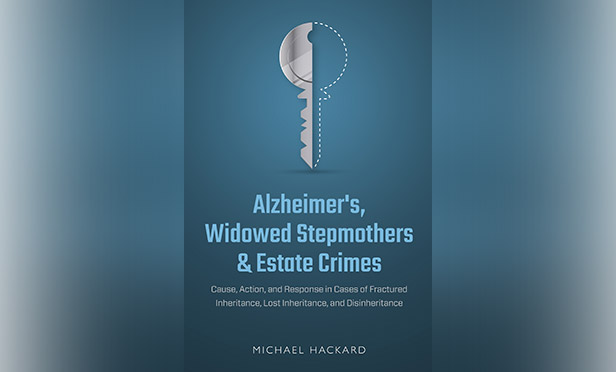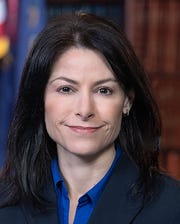 |
Laura Martinez married Charlie Thrash, 81, a
wealthy man who is legally mentally disabled, on March 4. The marriage
was annulled Friday.
Photo: Carlos Javier Sanchez /Contributor |
by John MacCormack, San Antonio Express-News
On March 4, Charlie Thrash married his girlfriend
Laura Martinez in a five-minute ceremony at a 19th-century mansion
overlooking Salado Creek.
The
next day, Thrash, 81, who is mentally incapacitated and a ward under
guardianship, adopted Martinez’s two adult children, Joe, 27, and
Brittany, 25.
One
day after that, Mary Werner, Thrash’s court-appointed permanent
guardian, went to his upscale home in Shavano Park with at least four
police officers and took him away.
His new wife has not seen him since.
“I
don’t know where he is. I just want Charlie back. I love him,” said
Martinez, 54, who had lived with Thrash for the last few years. “They
just want to get rid of me because I’m in the will.”
Calling the event “an abduction,” Martinez’s lawyer,
Phil Ross, quickly filed for restraining orders against Thrash’s two
guardians in Bexar County Probate Court.
Ross and Martinez have also tried to file criminal complaints over the matter but have found no takers.
“They
are going to brainwash him into saying he loves his kin more than he
loves the woman he’s been living with. They somehow think they can get
control of his estate if they get control of his mind,” said Ross, who
is known for unconventional legal tactics.
Adult
welfare officials and others paint a darker picture. They say Martinez
and her family members have been controlling and exploiting Thrash, who
for decades owned a successful specialty auto repair shop on San
Antonio’s near North Side. A report by the probate court’s investigator
includes claims of physical abuse.
Werner,
a former Shavano Park City Council member and an experienced
professional guardian, said she went to police — something she said she
had never done before in a guardianship case — after becoming concerned
for Thrash’s safety.
Recently,
she said, she received a series of calls from Thrash’s cell phone,
apparently dialed by accident, and overheard snatches of a disturbing
conversation.
“It
was a female and two men talking. Their voices were muffled. One said,
‘We have to do something by the end of the month,” Werner recalled in an
interview.
She said she also heard someone mutter the word “arson.”
Werner was also alarmed by a comment that Brittany Martinez allegedly made to the probate court investigator, Elaine Damian.
“Brittany
asked me directly, ‘What happens if Charlie dies? What happens to the
will and all this?’” Damian wrote in her report, which is strongly
critical of Martinez and her family.
Werner said that just a week earlier, Thrash had voiced his strong aversion to matrimony.
“He was very adamant about not getting married. He said his last divorce had cost him $1 million,” she said.
Werner said Thrash currently is staying with a relative and is doing well.
“He said, ‘Get me divorced and undo the adoptions,’” she added.
Vintage planes and cars
As
the longtime owner of Thrash Differentials and Axle Service on West
Avenue, Thrash did well for himself. A skilled mechanic and machinist,
he was frugal in his personal life and hard-nosed with his customers,
including friends and family members.
“He
never allowed anyone to have a free ride. If they couldn’t pay for
their driveshaft work, he wouldn’t give them their car until it was paid
in full,” his step-daughter Donna Galvanauskas said in a letter to the
court.
Born and raised in San Antonio, Thrash graduated from South San Antonio High School and served two years in the U.S. Army.
He was married and divorced twice before meeting Martinez and had no children of his own.
Among his pleasures was flying planes and going to car shows and races.
His
estate, worth over $3 million, includes real estate and airplanes,
among them a 1992 Beechcraft F33A and a 1989 Stoddard-Hamilton Glasiar.
His collection of classic cars included a 1966 Ford Shelby Mustang and
Ford Roadsters from the 1930s.
After
becoming involved with Martinez about five years ago, he bought an
expensive Corvette and a $750,000 house in Shavano Park. Before that, he
lived in an apartment above his repair business.
“Like a dad to me”
Next
door to his now-closed differential shop on West Avenue is his original
repair shop, Thrash Automotive, which opened in 1974.
In 1979, he sold it to a young employee, Mike Van Den Berghe, who retained the shop’s name.
“He’s
been like a dad to me. He helped me get started,” said Van Den Berghe,
now 61, who worked side-by-side with Thrash for decades.
He
said things began to go downhill at the differential shop about five
years ago after Martinez and other family members got involved in the
business.
“She
alienated Charlie from everyone. She wouldn’t let any of his friends
talk to him. She wouldn’t even let us talk to him. If he came over here,
she was right over to take him back,” he said.
About
two years ago, an anonymous complaint was filed on Thrash’s behalf with
Texas Adult Protective Services, which began an investigation.
According
to an affidavit filed in Bexar County Probate Court by Jacqueline
Berry-Jones, an APS supervisor, the complaint alleged that Thrash “was
being exploited by his paramour, Laura Alicia Martinez,” who by then had
power of attorney for him.
The
affidavit said Frost Bank had detected unusual activity in Thrash’s
business and personal accounts and was refusing to process certain
invoices.
“Financial
records at Frost Bank show that the Proposed Ward’s Money Market
Account is down from a balance of $302,546.45 as of May 8, 2017, to a
balance of $108,173.19 as of July 7, 2017,” the affidavit asserted.
An affidavit by Andrea Roelofs, an APS guardian specialist, expressed concern that Thrash was being isolated socially.
“Mr.
Thrash does not have his own phone number and all social and business
calls are through the cellular phone belonging to Laura Martinez,”
Roelofs wrote.
Roelofs
said Martinez showed her a list of “black listed” individuals who were
barred from contacting Thrash. They included former friends and business
associates.
Roelofs
also noted that Thrash’s ex-stepchildren complained that they were
unable to get in touch with him. A sister made a similar complaint in a
letter to the court.
“Totally without capacity”
On
Aug. 23, 2017, the Texas Health and Human Services Commission asked the
probate court to appoint guardians for Thrash and his estate.
“Under
the influence of his roommate, the Proposed Ward recently named his
roommate and her family as beneficiaries of his will and there seems to
be a conversion of assets into the roommate’s name, excessive spending,
and isolation from friends and family at the direction of the roommate,”
the commission’s court filing said.
The request for guardians was granted by then-Judge Tom Rickhoff.
In October 2017, Dr. Raymond Faber, a psychiatrist, examined Thrash to determine his mental competence.
“He
was able to discuss the fine points about axles and drive shafts. This
was in marked contrast to his fund of information regarding his
finances,” Faber said. “He estimated his net worth at about a half
million dollars. This was a seriously low estimate.”
Charles Thrash Psychiatric Capacity Examination by
My San Antonio on Scribd
Faber
said Thrash had only a spotty awareness of how his business was being
run by Martinez, and did not know that her son, Mario, was the highest
paid mechanic in the shop.
He wrote that Thrash did poorly on memory, mathematical and other written tests, and thought the year was 1917.
He
concluded that Thrash was “totally without capacity” to care for himself
or handle his business and financial affairs. The diagnosis: “most
probably dementia due to Alzheimer’s disease.”
With
the finding of incapacity came instructions from the court that Thrash
was not to marry, drive a car, vote or do other things that require
mental competence.
“A bigger ring”
Laura Martinez insists she has only Thrash’s welfare and happiness at heart.
“The
gold-digger thing is not true. Before Charlie Thrash, I had a man who
was 25 years older. Charlie is poor compared to him. If I wanted money, I
would have stayed with him,” Martinez said in an interview at the Black
Swan Inn off Rittiman Road, where she recently married Thrash.
“I’ve been accused of orchestrating a wedding for an incapacitated person, and that’s not true,” Martinez said.
In
preparation for the marriage, Martinez and Phil Ross, her lawyer, first
took Thrash to DeWitt County to obtain a marriage license.
Werner,
Thrash’s personal guardian, said she was not notified as required that
Thrash was leaving Bexar County, much less that he was getting married.
Both Martinez and her lawyer contend that Thrash has regained his mental capacity since he was examined by Dr. Faber.
Ross produced a letter from Dr. Manuel Naron, a family practitioner who apparently treated Thrash for diabetes and anxiety.
“In my opinion he is mentally capable of making financial and health care decisions for himself,” Naron wrote.
Martinez denied trying to isolate Thrash from his family and friends, and said he had been eager to become her husband.
“Charlie
said, ‘Yeah, we’re finally going to do it.’ He was happy and excited.
He said, ‘Later, we’ll get a bigger ring,”’ she said.
She said both of her adult children love him, and wanted to be adopted by him, and that Thrash agreed to it.
“I
have no idea how this will end. I want to get my Charlie back as quickly
as possible. I do love him, and this is a horrific experience,”
Martinez said.
Asked
how a neutral person would view their relationship, she said, “It’s a
no-brainer that Laura has Charlie’s best interests in mind. She provides
all the support he needs.”
“Concerning acts”
Since
the surprise March 4 wedding, the legal battle over Thrash has
intensified. Both the marriage and adoptions are being contested by his
guardians.
On
Tuesday, Tonya Barina, who is Thrash’s niece and the permanent guardian
of his estate, filed an eviction notice against Martinez and others
living in Thrash’s house in Shavano Park.
Four days later, she filed a motion demanding that Martinez turn over all vehicles and airplanes belonging to Thrash.
Citing
“threats and aggression” from the Martinez family, Barina stated she
could not make an inventory of Thrash’s assets without the assistance of
the court.
On
Thursday, Judge Oscar Kazen signed a temporary restraining order that
imposes numerous restrictions on Ross, Martinez and her family.
They
were directed to vacate any property owned by Thrash and were ordered
not to convert any of his assets to their own use, come within 500 feet
of him or engage in “aggressive, violent or threatening behavior” toward
his guardians.
On
Friday, after a 90-minute hearing, Kazen annulled the marriage between
Thrash and Martinez on the basis of his mental incapacity.
The judge was critical of some of Ross’ professional conduct involving Thrash.
“There are some concerning acts, that, if true, could prove to be either unethical or criminal,” he said.
Earlier last week, Van Den Berghe got a surprise visit from his old friend. A relative had brought Thrash by.
“He
walked around the shop for over two hours. He was in good spirits. He
remembered a lot of things,” said Van Den Berghe. “That was the first
time I’d seen him in eight or nine months.”
Full Article & Source:
San Antonio millionaire marriage annulled after abuse, exploitation and ‘abduction’ claims





















